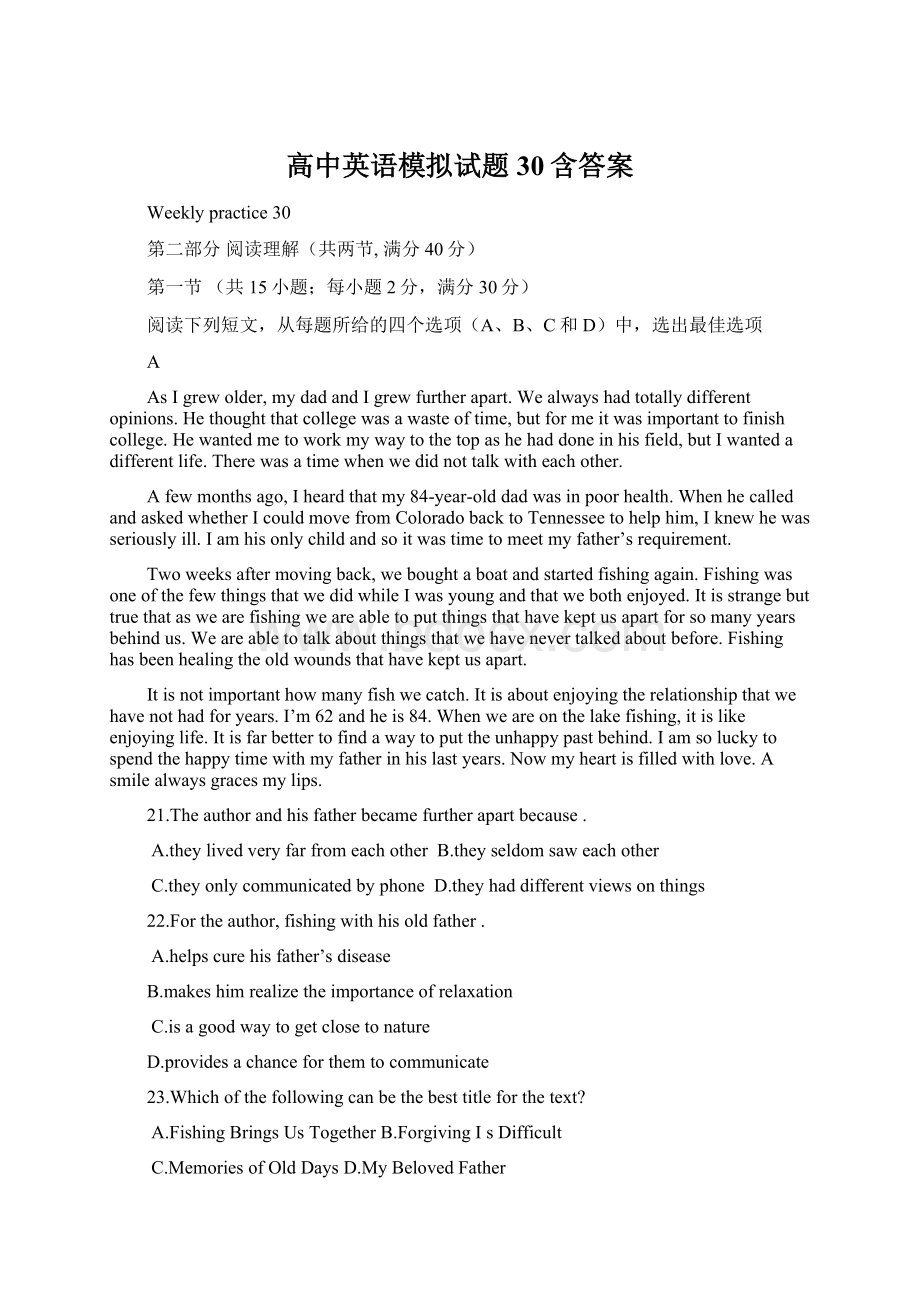高中英语模拟试题30含答案.docx
《高中英语模拟试题30含答案.docx》由会员分享,可在线阅读,更多相关《高中英语模拟试题30含答案.docx(10页珍藏版)》请在冰豆网上搜索。

高中英语模拟试题30含答案
Weeklypractice30
第二部分阅读理解(共两节,满分40分)
第一节(共15小题;每小题2分,满分30分)
阅读下列短文,从每题所给的四个选项(A、B、C和D)中,选出最佳选项
A
AsIgrewolder,mydadandIgrewfurtherapart.Wealwayshadtotallydifferentopinions.Hethoughtthatcollegewasawasteoftime,butformeitwasimportanttofinishcollege.Hewantedmetoworkmywaytothetopashehaddoneinhisfield,butIwantedadifferentlife.Therewasatimewhenwedidnottalkwitheachother.
Afewmonthsago,Iheardthatmy84-year-olddadwasinpoorhealth.WhenhecalledandaskedwhetherIcouldmovefromColoradobacktoTennesseetohelphim,Iknewhewasseriouslyill.Iamhisonlychildandsoitwastimetomeetmyfather’srequirement.
Twoweeksaftermovingback,weboughtaboatandstartedfishingagain.FishingwasoneofthefewthingsthatwedidwhileIwasyoungandthatwebothenjoyed.Itisstrangebuttruethataswearefishingweareabletoputthingsthathavekeptusapartforsomanyyearsbehindus.Weareabletotalkaboutthingsthatwehavenevertalkedaboutbefore.Fishinghasbeenhealingtheoldwoundsthathavekeptusapart.
Itisnotimportanthowmanyfishwecatch.Itisaboutenjoyingtherelationshipthatwehavenothadforyears.I’m62andheis84.Whenweareonthelakefishing,itislikeenjoyinglife.Itisfarbettertofindawaytoputtheunhappypastbehind.Iamsoluckytospendthehappytimewithmyfatherinhislastyears.Nowmyheartisfilledwithlove.Asmilealwaysgracesmylips.
21.Theauthorandhisfatherbecamefurtherapartbecause.
A.theylivedveryfarfromeachotherB.theyseldomsaweachother
C.theyonlycommunicatedbyphoneD.theyhaddifferentviewsonthings
22.Fortheauthor,fishingwithhisoldfather.
A.helpscurehisfather’sdisease
B.makeshimrealizetheimportanceofrelaxation
C.isagoodwaytogetclosetonature
D.providesachanceforthemtocommunicate
23.Whichofthefollowingcanbethebesttitleforthetext?
A.FishingBringsUsTogetherB.ForgivingIsDifficult
C.MemoriesofOldDaysD.MyBelovedFather
B
Belowarethebestfourapplicationstohelpyouorganizeyourcloset(橱柜)—andtrustus,therereallyissomethingforeveryone.
Closet
Ifyou’relookingtocreateyourowndigitalcloset,thenthisappisforyou.Closethelpsyoucategorizeyouroutfitsandkeepsyouup-to-dateonwhatyou’vealreadyworn.
PROS:
Verysimpleanduser-friendly.Greatforhelpingyoulookatyourownclosetwithoutfeelingoverwhelmed.
CONS:
Nosocialinteractions.Thisappisstrictlyforhavingamobileversionofyourcloset.
Pose
Theappmakesthingsinsanelyeasyfortheindecisiveshopper.Soifyou’redebatingwhetherornottobuysomething,youcangetasecondopinion.Theappalsogathersphotosofitemsthatyouwishtobuyanditemsyoualreadyown,sotheyareallinonespot.
PROS:
Whenyousignup,youfilloutashortsurveythathelpsidentifyyourpersonalstyleandsubsequentlyfindspeoplewithsimilartastethatyoucanfollowforinspiration.
CONS:
Thephoneapplicationismorevisuallyappealingthantheactualwebsite.
Stylitics
itallowsyoutocategorizeyourclothesbycolor,brand,patternandmore.Andifyou’rewonderingwhetheryouhavealreadywornanoutfit,simplycheckyourstylecalendar.
PROS:
Theappcomeswitha“TodayinFashionHistory”tipsoyoucanbrushuponyourstyleknowledge.
CONS:
Youcan’tviewyourstyleprofileusingtheappyetunlessyoulogontothesite.
WalkinMyCloset
Ifyou’rebrowsingtheInternet,lookingforsomethingtobuy,youcaninstantlyaddtheitemtoyourvirtualclosetsothatyourwishlistitemsarealloneplace.Besidessharingyourclosetwithotherusers,youcanalsosellitemsyounolongerwant.
PROS:
The“Moodboard”isagreatwaytogatherinspiringlooksthatyoulikefromotherusersandfashionexperts.
CONS:
Theluggagefeature,whichallowsyoutoprepareoutfitsforanupcomingtrip,isonlyavailableonthesite;itwouldbeusefulifitwereontheapp.
24.Whichofthefollowingcanreplacetheunderlinedword?
A.Instantly.B.Accurately.C.Deliberately.D.Incredibly.
25.Whichofthefollowingisdesignedforpeoplewhooftenhesitatewhenbuyingclothes?
A.Closet.B.Pose.C.Stylitics.D.WalkinMyCloset.
26.WhatcanwelearnaboutWalkinMyClosetfromthepassage?
A.Itisasimpleanduser-friendlyapp.
B.Ithelpsyouconfirmyourpersonalstyle.
C.Itcombinesbothshoppingandorganizingyourcloset.
D.Itrequiresyoutologonthesitetoviewyourstyleprofile.
27.Thepassagemainlytellsus.
A.aboutthefourbestfashionappstohelporganizeyourcloset
B.howtousethesefashionapps
C.thateveryonecanfindtheirownpersonalstyle
D.thatweshouldshareourclosetwithfriends
C
Whilemostofusarehappytotakethecreditwhenthingsgowell,fewofusarewillingtotaketheblamewhenthingsgowrong.Ratherthantryingtohideourshameorembarrassment,expertsfoundthatwearesimplylessawarewhenouractionsresultinanegativeoutcome.
Theresearchmayexplainwhyweoftenfeelithardtotaketheblameforouractions.“Ourresultsuggeststhatpeoplemayreallyexperiencelessresponsibilityfornegativethanforpositiveoutcomes,”saidPatrickHaggard,leadingresearcherandprofessoroftheinstituteofCognitiveNeuroscienceatUniversityCollegeLondon.
Inaseriesoftests,participantswereaskedtopressakey.Asoundthenfollowed,eitherdisapproving,neutralorapproving,andtheywerethenaskedtoestimatethetimebetweentheactionandwhentheyhadheardthesound.
Researchersfoundthatindividualsexperienceddifferentlevelsofresponsibilitydependingontheoutcomes.Theyalsodiscoveredtheyweresignificantlyslowertorecognizeiftheiractionshadresultedinabadconsequence,comparedtowhentheyhaddonewell.
“Effectively,wehavefoundthatweexperienceanegativeoutcomedifferently,notjustretellitdifferently.Wemakeaweakerconnectionwhenthereisabadresult.Andrespondmuchmorestronglywhensomethinggoodhappens,”saidProfessorHaggard.Whensomethinggoesright,everyonewantstotakethecredit,andwhenthingsgowrong,nobodyisinterestedinputtingtheirhandsup.
Theresearcherssaidourbrainis“verymuchconcerned”withreward,asgoodresultsarekeytosurvival.Althoughourownperception(认知)ofwhetherweareguiltyofsomethingornotischangedbytheoutcomes,thisdoesnotprovideadefenseifwehavedonesomethingwrong.“Ourexperienceofourownresponsibilitiescanbemisleadingandcanbestronglycoloredbytheoutcomesofouractions.”saidProfessorHaggard.“Wehavetotakeresponsibilityforwhatactuallydo,notjustforhowweexperiencethings.”
28.Peoplewhodon’ttaketheblamefortheiractions.
A.alwaystrytohidetheirshameorembarrassment.
B.areonlywillingtotakethecreditwhenthingsgowell
C.feellessresponsiblefornegativethanforpositiveoutcomes
D.arelessawareofwhattodowhenanegativeoutcomehappens
29.WhichofthefollowingstatementsisTRUE?
A.Ourlevelofresponsibilitycanbestronglyaffectedbytheoutcomesofouractions.
B.Whensomethingbadhappens,nobodyisinterestedindealingwiththeproblem.
C.Peoplewerequickertorecognizeiftheiractionshadresultedinabadconsequence.
D.Participantswereaskedtocountthetimebetweenpressingakeyandhearingthesound.
30.Howisthepassagedeveloped?
A.Bygivingexamples.B.Byquotingresearchfindings.
C.Byanalyzingcauseandeffect.D.Byprovidingdata.
31.Accordingtothepassage,apersonwhoisconcernedwithrewardis.
A.awkwardB.naturalC.absurdD.stubborn
D
AteamledbyProfessorTheoderBerger,fromtheUniversityofSouthernCalifornia,cannowmanipulate(操纵)braincellsinratssothatmemoriesstoredinthehippocampus,abrainareacrucialformemoryformation,areactivatedorsuppressed(抑制).It’ssaidthatthetechnologycouldonedayhavemedicalapplications.
Inthestudy,researcherfirsttrainedratstorememberwhichoftwolevers(杠杆)theypressedfirst,thentopresstheotherlever.
Astheratsperformedthetask,thescientistscarefullymonitoredtheelectricalactivityineachcreature’shippocampustofindthepatternofnerve-cellactivityinvolvedinmakingasolidmemory.
Usingthesameglassneedlestheyhadusedtorecordthenerveactivity,theystimulated(刺激)nervesinthesamepatternandfoundthattheanimals’performanceinthetaskgotevenbetter.Theratsmadefewererrorsandwereabletorememberwhichleverwasthe“correct”oneforalongerperiodoftime.
Thescientistswentastepfurtherandsuppressedtherats’memorieswithadrugcalledMk801,whichcausedthemtoforgettheirtask.Whentheanimals’braincellswerelaterstimulatedwiththe“correct”pattern,theyrememberedagainwhichlevertopress.
“What’sreallyexcitingaboutthisstudyisthatwhentheyplayedbackthe‘good’patterns—thepatternswhentheanimalgotthetaskright—itdidappeartoimprovememory,”saidDeanBuonomano,anassociateprofessorattheUniversityofCalifornia.
Thefinalgoal,Bergersaid,istohelppeoplewithstroke(中风)andepilepsy(癫痫症)andthelikestrengthenmemoriesandtohelpdoctorstreatthem.Thetechnologymightevenhelpsufferersofpost-traumatic(创伤后)stressdisorder.
Butfirst,researcherswouldhavetoshowthattheycanstimulateorsuppressfarmorecomplexmemoriesthantheonesintheratexperiment.
“Here,it’sasimpletask,”Buonomanosaid.Incontrast,humans’memoriesareveryrichandspecific…
“Wehaveverymanystepstogobeforethiscanbeachieved,”hesaid.
32.Howdoes“thetechnology”inParagraph1act?
A.Itmanipulatesbraincells.
B.Itstoresmemoriesinthehippocampus.
C.Itactivates